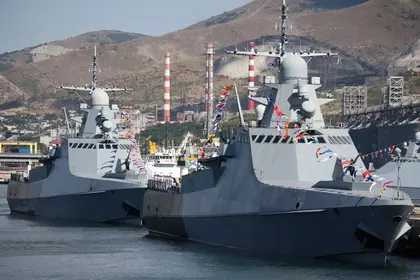Spokespersons for Ukrainian partisans operating behind Russian lines in Crimea on Tuesday told Kyiv Post that most of the warships of Russia’s Black Sea Fleet have sailed away from their home port in Sevastopol and don’t seem to be in much of a hurry to return.
A representative of the military partisan movement of Ukrainians and Crimean Tatars ATESH told Kyiv Post that the Sevastopol port saw a systematic exodus of Russian warships following successful missile strikes on Sevastopol in September.
JOIN US ON TELEGRAM
Follow our coverage of the war on the @Kyivpost_official.
The most significant damage caused by salvoes of British and French cruise missiles launched by Ukrainian Air Force bombers included the destruction of a Russian amphibious assault ship, a modern attack submarine, three military dry docks, and the Black Sea Fleet (BSF) headquarters building in Sevastopol, which took two hits during a morning meeting attended by senior BSF staff including the fleet commander.
A partisan spokesperson in the wake of those strikes told Kyiv Post, in exclusive comments, that the attacks succeeded in part because a member of the Russian Navy agreed to provide targeting information, including the precise location of warships, to Ukrainian underground operators passing on the information to air force strike planners.
Ukrainian observers confirmed multiple Russian warships had departed the harbor en masse by early October.
According to a partisan spokesman, two months after the Sevastopol missile strikes, on-the-ground operatives have confirmed the Russian ships that left have not returned to Sevastopol, and instead have transferred to less-capable naval facilities in the port of Novorossiysk, in Russia’s Kuban region.

Christmas in the Forests With Those Who Fought Hitler and Stalin
Ukrainian agents operating in Russian territory are monitoring Russian fleet movements from Novorossiysk, and planning strikes there as well, the source said.
“We know that they (Russian fleet commanders) are looking for ways to counter Ukrainian strikes. However, earlier in August, there were already strikes on Novorossiysk,” the ATESH spokesperson said.
In a public statement, ATESH claimed Russian naval leadership was deeply concerned about a possible continuing inability to keep warships afloat.
“There is a real panic in the enemy’s ranks. The enemy guesses that new attacks on their fleet are coming and is trying to save them,” the ATESH movement wrote on Telegram.
You can also highlight the text and press Ctrl + Enter










